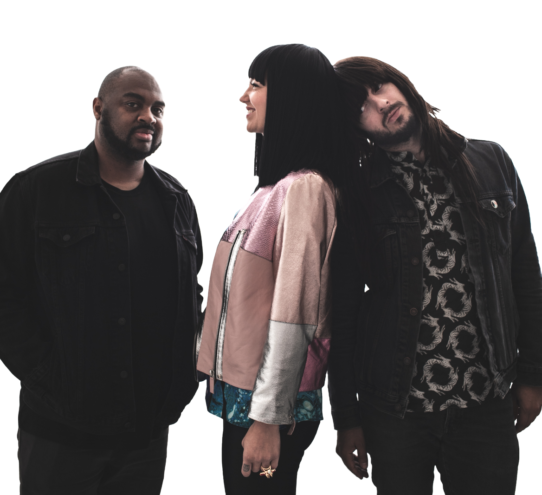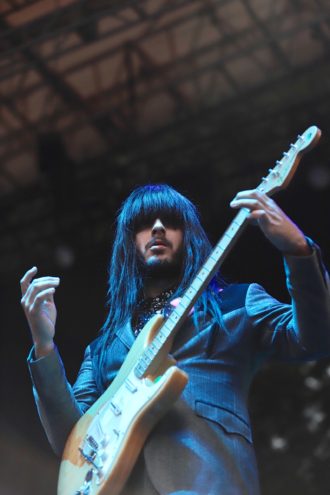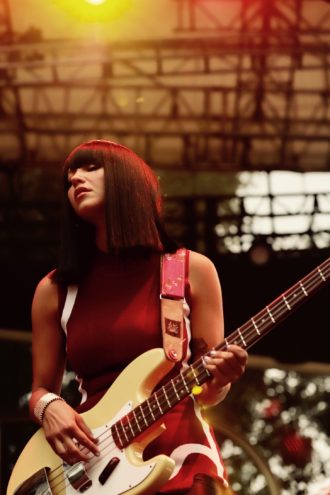Khruangbin

If “Khruangbin” means airplane, then what does it mean to fly? In one sense, it means to hover above things as arbitrary as genre distinctions, which Laura Lee, Mark Speer and D.J. Johnson seem to do, casting wry smiles down at those who would try to classify them as this or that. In another sense, it means to travel, as the Texan trio does freely, touching down wherever they hear the music rising skyward. In a third and final sense, it means to reach toward some higher ground, to rise up into that same expanse people have long thought must contain god, or a life beyond.
Con Todo El Mundo, the group’s second album, is an exercise in all of these types of flight and more, synthesizing countless global influences into something that could be called jazz, psych, funk, gospel, or something else entirely. The album’s title gestures at this inclusivity but also serves as a response to the songs which bookend the record’s first side: “Como Me Quieres” and “Como Te Quiero,” (or, “How You Love Me” and “How I Love You”). The album, and these songs in particular, stands as a memorial to Laura Lee’s grandfather. Indeed, there is often something elegiac in their sound: progressions that pass through minors and majors like bittersweet memories.
There’s also the funk, materializing on tracks like “Maria Tambien,” which finds guitarist Speer riffing in Middle Eastern pentatonics, while drummer Johnson and bassist Lee lay down a groove reminiscent of early Wu-Tang. At one point while opening for Leon Bridges in early September, they broke into a suite of Dr. Dre’s greatest hits, blurring the lines between the beats and the original samples from the likes of the Isley Brothers, George Clinton, Donny Hathaway, and Willie Hutch. I met the group before that show to talk about Con Todo El Mundo, their philosophies on playing and recording, and what it means to make and enjoy music that will stand the test of time.
ELEVEN: Khruangbin, you’re here in Portland! I assume it’s not your first time here. How would you characterize this city?
Mark Speer: I don’t know if I could. Every time I’m here it’s different. I think I’ve been here three or four times…
Laura Lee: This part of America feels like if the East Coast and the West Coast had a baby: it would be Seattle and Portland.
[At this point in the interview, a train passes through the yard below the studio building, horn blaring, loud enough that we have to wait for it to pass.]
11: So, uh, you guys travel by train much?
LL: We did when we were in Europe.
MS: Yeah, and at the Grand Canyon.
11: Speaking of modes of travel, Khruangbin means airplane in Thai, and you’ve got something of an aviation theme going on. Could you speak a little bit about that?
MS: I mean, it’s called airplane, so it’s kinda an easy theme to go off. It wouldn’t make sense to be car-related.
LL: It’s fun. You just find a thing that works and have fun with it. We’re the cabin crew.
MS: We’re trying to pull from as many places as we can, so it makes sense to fly.
11: Sure. Your last appearance here was with Leon Bridges?
D.J. Johnson: Our agent set that up, but it’s a good pairing. If someone was building a station, I think we’d be on the same station. Everyone in the Leon crew is really cool; it’s a good fit.
LL: A lot of them are from Texas, so it’s like a little Lone Star crew.
11: With your newest record, Con Todo El Mundo, the way I’ve listened to it just about every time is just to put it on and listen the whole way through. It has this really nice flow, the way your tracks are ordered and the vibes make it work. Is that the way you guys prefer to listen to music?
LL: I mean, if you’re making an album, it should play like an album.

11: Do you feel as though there’s more of an emphasis on the single these days?
LL: Obviously in pop music it’s always gonna be that way. You’re making singles for radio play, so it’s not about the album. I think sometimes it might be hard for Khruangbin tracks to work that way, because they’re so much a part of the larger movement of the record.
MS: I think there’s a big emphasis too on playlists, but there’s a flow to a playlist, or a mix, and even if it’s a bunch of different artists, the flow has to be right. That’s how an album should be as well. So I don’t necessarily listen to albums top to bottom, but I listen to a lot of mixes, and I think our albums should be like that, so it takes you somewhere.
LL: I do think my favorite records are top to bottom; you just put the needle down…
11: On that note, you guys are known for your vinyl digging and your use of that medium. When you’re digging for records, what’s the first thing you look for?
MS: (laughs)
11: Or is it one thing? What’s your approach?
MS: Right now, like yesterday, I was digging in Seattle, and I was only looking for 7’s — 7-inch 45’s. And I was looking for stuff that either would be good in a mix or was a little nostalgic. I’m usually looking for world funk, and if I can’t find that, I’m looking for Whitney Houston or something like that…
LL: It depends, you know. He was going with a specific intention of finding 7-inches, and they were all like 45 cents, so you just go, “oh, I love this song,” and there it goes.
MS: You shoulda seen the stack I didn’t get. (Laughs)
LL: It depends on the shop. Sometimes you find shops that have a whole room of $2 records, and they’re not organized in any way, and sometimes you find a shop that has like three whole stacks of world music.
MS: Usually I look for disco and boogie between the years of ‘77 and ‘82. Everything from that time sounds great.
LL: You also get to know labels and producers, and then when you see those names, you know it’s gonna sound good.
11: Speaking of sounding good, you guys are rumored to have a recording barn where you cut your albums. Can you speak a little bit about that and your recording process in general?
DJ: I think they’re really just more barn recordings than it is a “recording barn.” I mean, it’s a barn. There’s nothing treated about it, sonically, so there’s lots of nature that crawls inside. There are dirt floors. Sound bounces off the walls in a special way, and it adds character to the tone.




11: I’ve noticed about your recording that you’ve been able to capture this really live feel. There are a lot of ways now you can make music with loops and digital audio workstations and things. How focused are you guys on doing things live? How much do you play live versus recording things in post?
DJ: The three of us record everything together, all live. The only thing you hear that’s overdubbed is some percussion and vocals.
MS: Sometimes some keyboard.
LL: But the bass, drums and guitar is all recorded live together.
11: Mark, a guitarist friend of mine who’s listened to you a lot was talking about your use of pull-offs as opposed to hammer-ons, especially on this new album. Was that a conscious decision to create a certain kind of sound?
MS: Man, I just wanna make it sound like a voice or an instrument other than a guitar, so it’s whatever techniques I gotta use to do that. I guess, yeah, it’s all hammer-ons and pull-offs and pentatonics.
DJ: I’ve been analyzing Mark’s guitar playing for the last 10 years, and all I can say is, good luck. (Laughs)
11: I did also want to talk a bit about how you guys see vocals fitting into a song. When you do have vocals, everyone is singing them.
MS: Yeah, no lead vocals. (Laughs)
LL: They’re the last thing to come on a song. So we treat it like percussion in a way. It’s secondary to bass, guitar and drums, as opposed to more traditionally, where you start with vocals, and add the rest around that.


11: As a writer, I’m someone who pays attention a lot to lyrics. Do you guys have a method for composing lyrics, or do you just write what comes? How do you find the words?
MS: I’m usually just terrified to write lyrics, in general.
LL: I think we have a sonic approach to writing lyrics, so the melody comes before the words, and the words are fitting in and are really just placeholders for the sound. We try to use words that sing prettier. You know, there are some words that just don’t sing pretty, like “calculator.” I mean, you could, but you know what I mean.
MS: “Email” doesn’t really sound like a pretty word to sing. It’s not very poetic…
11: Still, it doesn’t feel as though your lyrics are impersonal. One of the songs I wanted to talk about, “Cómo Te Quiero,” doesn’t have traditionally sung vocals, but does have that vocal sample…
MS: Those are actually recorded vocals, not a sample.
LL: Yeah, we sang through a Leslie, so it sounds psychedelic, like you’re inside a tornado. There were more lyrics for that song, but I ended up cutting some of them.
MS: We kept deconstructing it down to its center.
LL: We kept deconstructing it, and then I’d do a sort-of voiceover. It’s a letter to my grandfather that I’m reading, really far in the back.
11: Yeah, it’s one of those moments that makes you listen close, makes you get in there, to hear what’s being said. I do also think the video, which I love, says more than any words could about what the song means to you. Could you speak a little bit about how you see the relationship between music and visuals, and how you told that story?
LL: Yeah, I’ve talked about my grandfather being a source of inspiration for me, in general, and I think I used this album to get that out. When the opportunity came to work with this animator, Cossa, and to make a video for this song, it felt like I needed to have my peace with it. It was the story that I needed to have peace with, and so I talked to the animator about being with my grandfather on his deathbed, and my grandfather was tripping out, basically, for lack of a better word, either because he was on meds or he was close to death, or both. He was in Singapore, and there were flowers falling on him, and there was all this stuff happening to him while he was in the bed. And I sort of went on a last adventure with him in his mind. I wanted the video to feel like one last adventure, and [Cossa] worked with me to find ways to represent that. I love that video so much.
11: Had you guys worked with Cossa before?
LL: No, I think it was like the second video he’d ever done.
11: There’s a simplicity to that animation style and also to your music that fits really well. Like with the vocals, they have this very specific place and nobody is really stepping out and being the lead. And any musician will tell you that restraint is one of the hardest things to do. I’ve noticed that a lot in your guy’s playing, your sense of restraint.
LL: I feel like D.J. is really the master of restraint.
DJ: Great things happen in spaces. When you just sit back and you’re not doing anything, you can say more with a rest than you can with a note. So my approach to playing comes from what’s happening between the notes, in the spaces. What we do as a band a lot is play with space. The number one thing I hear about our recordings, especially from a lot of hip-hop producers I know, [is] the space. Some of it has to do with the environment that we record in, and some of it has to do with arrangement and not filling things up too much.
LL: I think the biggest challenge in any sort of art is to stand the test of time, and I think most things that are classics or timeless are somewhat restrained. You’re not gonna find something that’s overdone that’s still around, and there’s a lesson in that.
11: You guys have talked a lot about a wide variety of influences. People say your first album has Thai influences, this new one has Spanish, some Chinese influences, and obviously it’s hard to compartmentalize that in any real way, but do you guys have something that’s particularly inspiring you right now or a direction of influence that you find yourselves moving toward?
MS: Everything goes in the pot. That first album, although it gets talked about as being “Thai,” there’s a lot of stuff in there besides that. The second album, the same thing, and I feel like we’re gonna keep doing that. Whatever we hear, we’re gonna put it in there, and we’re gonna try mixing things together.
LL: I think the commentary comes after. Like, “Oh, that song totally sounds like this influence,” versus us going in and saying, “We’re gonna write a song in this style.”
11: Yeah, that’s something I’ve wrestled with as someone who writes about music and tries to describe it in a way that’s accessible. It’s like, “Just listen to it.” But anyways, before we wrap it up here, do you have any upcoming projects? Stuff in the works? Things that you’re stoked on that you want to plug?
DJ: Yes.
MS: Yes, there are things we’re stoked on.
DJ: Not a lot we can talk about…
LL: Yeah, there are definitely things in the works, and we’re super excited about all of them!
[All photos by Katie Summer] [Khruangbin plays live at McMenamin’s Crystal Ballroom on November 17, 2018]


